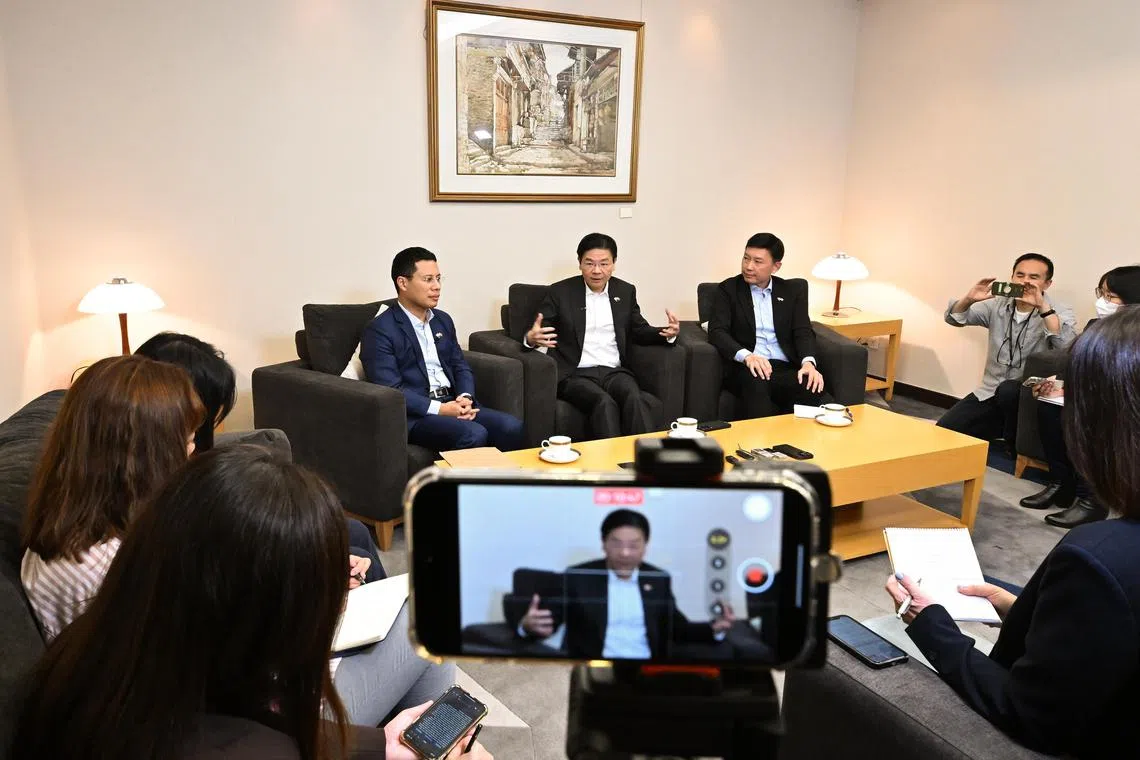Singapore to keep finding ways to add value to China, says DPM Lawrence Wong
Sign up now: Get insights on Asia's fast-moving developments

(From left) National Development Minister Desmond Lee, DPM Lawrence Wong and Acting Transport Minister Chee Hong Tat speaking to media in Beijing on Dec 8.
ST PHOTO: LIM YAOHUI
Follow topic:
BEIJING – Singapore has to constantly find ways to provide value to its relationship with China, whether it is in sharing its experience in grappling with an ageing population or linking China with the wider region.
At the same time, the world’s second-largest economy, with its considerable strengths today, also offers lessons for Singapore.
More than three decades since establishing bilateral relations, the relationship is now one of mutual learning and collaboration, said Deputy Prime Minister Lawrence Wong.
Speaking to Singapore media as he wrapped up a four-day visit to China, DPM Wong, flanked by his Cabinet colleagues Desmond Lee and Chee Hong Tat, said that Singapore, in its role as a reliable and trusted partner, can also connect China to the wider region.
On Dec 7, he co-chaired the top-level collaboration platform
Singapore can contribute its economic capabilities and technologies to the bilateral cooperation, DPM Wong said, in response to a question from The Straits Times about what the Republic brings to the table.
At the same time, China has strengths in areas like electric vehicles, renewable energy and even the green economy, he said.
“We can complement each other in the economic arena.”
Singapore can also share its social and community practices, DPM Wong said.
“We do it in our public housing estates in quite a unique fashion, with services readily available with our void deck amenities,” he said, noting that this caters to a rapidly ageing population – a challenge both countries face.
“And that’s something that China has already started to do in Tianjin Eco-City, and they are interested in seeing how they can scale up across other cities in China as well,” he added.
Tianjin Eco-City is the second government-to-government project between both sides. It was launched in 2008 and is shifting from sustainable urban development to being a model for high-quality, low-carbon growth.
Mr Lee, the Minister for National Development, noted that in the early years of the project, it was Singapore that added value to the city with its expertise.
However, this changed in the past 10 years as the Chinese became advanced in many of these sustainable technologies.
Mr Lee said: “It’s not just for us to continue to collaborate with China, but (it is) an opportunity also for us to learn about the way they do things. We compare notes, work together and some of these ideas may be helpful to us in Singapore.”
Investments in certain sectors remain ‘very healthy’
When asked if the economic headwinds faced by China have affected bilateral collaboration, DPM Wong replied that there continue to be “tremendous opportunities” for both sides to work together.
“The investments from Singapore into China with regard to real estate have slowed down somewhat. And that’s understandable, given the oversupply of real estate in China and how they are working through and resolving some of these issues.
“But if you look at investments in real economic activities – manufacturing, logistics, green economy, renewable energy – these sorts of investments remain very healthy,” DPM Wong said.
China has had a sluggish post-Covid-19 economic recovery
Official data showed youth unemployment was at a record high
The Chinese government had earlier in 2023 set an economic growth target of “around 5 per cent”, a number that will probably be exceeded, DPM Wong said.
“The medium-term prospects – well, people have different forecasts, but I would say, never bet on the decline of China because China’s economy is of such tremendous scale, (with) so many different areas of strength in advanced manufacturing, in the green economy, and on top of that they have such a huge market.”
When businesses and investors see opportunities, the government, through cooperation platforms like the JCBC, can help to facilitate mutually beneficial partnerships, he added.
DPM Wong said that cooperation with China at all levels of government has also been useful in forging closer ties, citing his experience as previous co-chair of the Sichuan, Tianjin and Shanghai business councils.
There are eight such provincial business councils between Singapore and China.
“When you get involved in these sorts of cooperation mechanisms, you meet with many people, you engage Chinese leaders at the provincial level in the first instance. And then you make many friends and, over the course of a few years, you see many of them move up their system. And you continue to have friends everywhere,” he said.
DPM Wong cited the example of Tianjin Communist Party chief Chen Min’er, who had previously worked with all the ministers in the Singapore delegation in China this week during his stint as Chongqing’s party chief.
They worked together when the third government-to-government project, the China-Singapore (Chongqing) Demonstration Initiative on Strategic Connectivity, was launched in 2015.
Mr Chee, who is Acting Minister for Transport, said being part of the JCBC delegation was a good opportunity to meet Chinese leaders and understand the latest developments in the country from their perspective.
“I think it’s through these engagements and interactions that we know each other better, and we identify what are the common challenges and also what are the opportunities that we can work on together,” he said.


